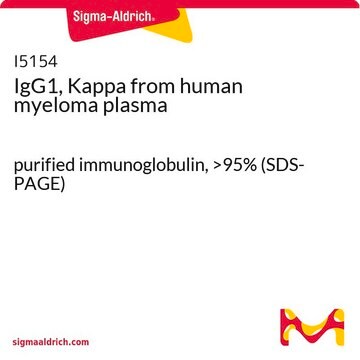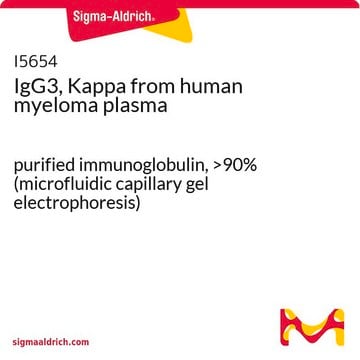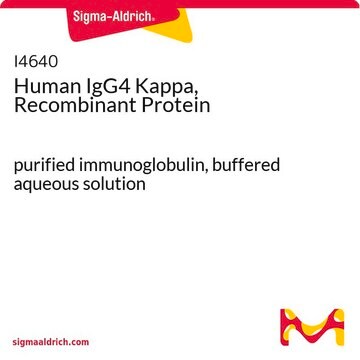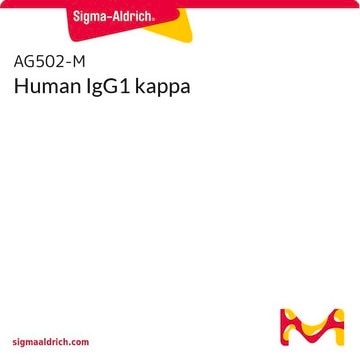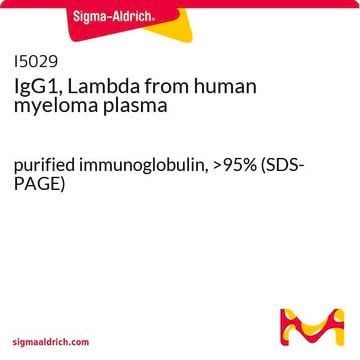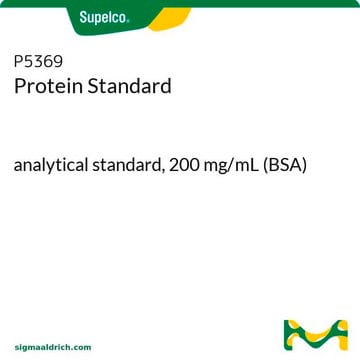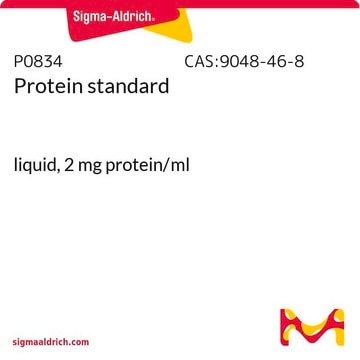Összes fotó(1)
Fontos dokumentumok
I5404
IgG2, Kappa from human myeloma plasma
purified immunoglobulin, >95% (SDS-PAGE)
Szinonimák:
Human IgG2-κ
Bejelentkezésa Szervezeti és Szerződéses árazás megtekintéséhez
Összes fotó(1)
About This Item
application:
citations:
11
Javasolt termékek
biológiai forrás
human
Minőségi szint
konjugátum
unconjugated
antitest forma
purified immunoglobulin
Teszt
>95% (SDS-PAGE)
kiszállítva
dry ice
tárolási hőmérséklet
−20°C
Looking for similar products? Látogasson el ide Útmutató a termékösszehasonlításhoz
Általános leírás
IgG antibody subtype is the most abundant serum immunoglobulins of the immune system. It is secreted by B cells and is found in blood and extracellular fluids and provides protection from infections caused by bacteria, fungi and viruses. Maternal IgG is transferred to fetus through the placenta that is vital for immune defence of the neonate against infections.
Human myeloma IgG2, κ is purified from human plasma by fractionation, ion-exchange and affinity chromatography procedures.
Human myeloma IgG2, κ is purified from human plasma by fractionation, ion-exchange and affinity chromatography procedures.
Alkalmazás
The purified IgG2, κ may be used as an immunoglobulin calibrator, reference antigen, blocking agent or coating protein in a variety of immunoassays including ELISA, dot-blot immunobinding, Western immunoblotting, immunodiffusion, immunoelectrophoresis, hemagglutination, and cell-binding assays. Human myeloma IgG2, κa was used to characterize the trisulfide modifications in human and mouse antibodies and in flow cytometry.
Fizikai forma
Solution in 0.02 M Tris buffered saline, pH 8.0.
Analízis megjegyzés
Identity is determined by immunoelectrophoresis and indirect ELISA.
Jogi nyilatkozat
Unless otherwise stated in our catalog or other company documentation accompanying the product(s), our products are intended for research use only and are not to be used for any other purpose, which includes but is not limited to, unauthorized commercial uses, in vitro diagnostic uses, ex vivo or in vivo therapeutic uses or any type of consumption or application to humans or animals.
Tárolási osztály kódja
10 - Combustible liquids
WGK
WGK 1
Lobbanási pont (F)
Not applicable
Lobbanási pont (C)
Not applicable
Válasszon a legfrissebb verziók közül:
Már rendelkezik ezzel a termékkel?
Az Ön által nemrégiben megvásárolt termékekre vonatkozó dokumentumokat a Dokumentumtárban találja.
Az ügyfelek ezeket is megtekintették
Jonatan Dewulf et al.
Cancers, 13(9) (2021-05-06)
The involvement of RANK/RANKL signaling in the tumor microenvironment (TME) in driving response or resistance to immunotherapy has only very recently been recognized. Current quantification methods of RANKL expression suffer from issues such as sensitivity, variability, and uncertainty on the
Jorn J Heeringa et al.
Allergy, 75(5), 1121-1132 (2019-10-07)
While treatment for atopic rhinitis is aimed mostly to relieve symptoms, only allergen-specific immunotherapy (AIT) is targeted to modify the natural history of allergic diseases. This results in sustained clinical tolerance, even when treatment has stopped. The immunomodulatory effects of
Sheng Gu et al.
Analytical biochemistry, 400(1), 89-98 (2010-01-21)
Trisulfides are a posttranslational modification formed by the insertion of a sulfur atom into a disulfide bond. Although reports for trisulfides in proteins are limited, we find that they are a common modification in natural and recombinant antibodies of all
Misty W Stevens et al.
mAbs, 6(2), 547-555 (2014-02-05)
Ch-mAb7F9, a human-mouse chimeric monoclonal antibody (mAb) designed to bind (+)-methamphetamine (METH) with high affinity and specificity, was produced as a treatment medication for METH abuse. In these studies, we present the preclinical characterization that provided predictive evidence that ch-mAb7F9
Zhongqi Zhang et al.
mAbs, 11(8), 1381-1390 (2019-08-15)
Human IgG antibodies containing terminal alpha 2,6-linked sialic acid on their Fc N-glycans have been shown to reduce antibody-dependent cell-mediated cytotoxicity and possess anti-inflammatory properties. Although terminal sialylation on complex N-glycans can happen via either an alpha 2,3-linkage or an
Tudóscsoportunk valamennyi kutatási területen rendelkezik tapasztalattal, beleértve az élettudományt, az anyagtudományt, a kémiai szintézist, a kromatográfiát, az analitikát és még sok más területet.
Lépjen kapcsolatba a szaktanácsadással